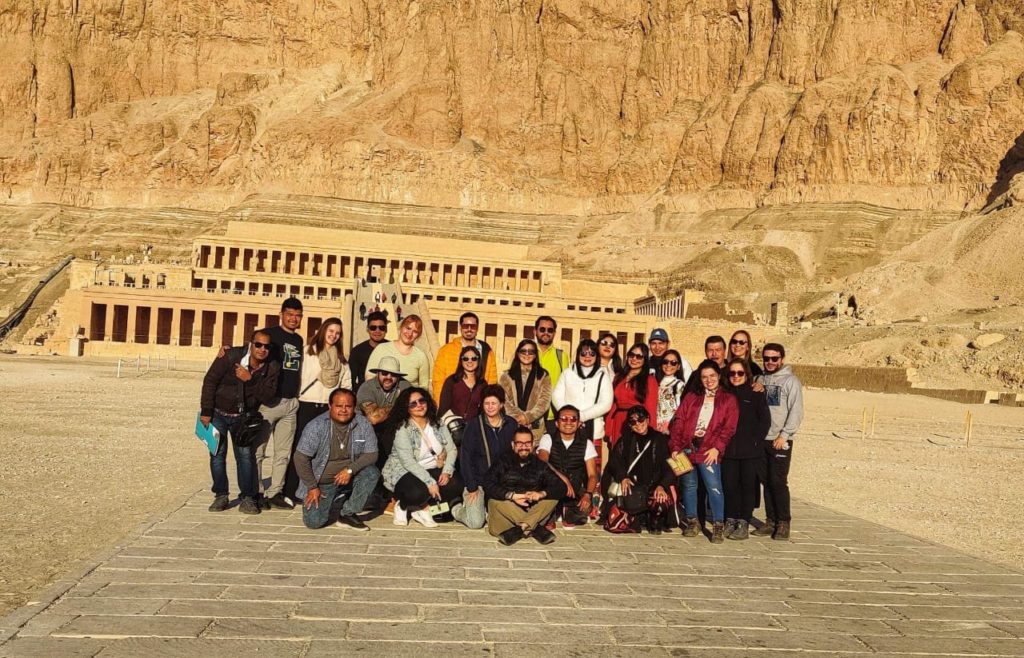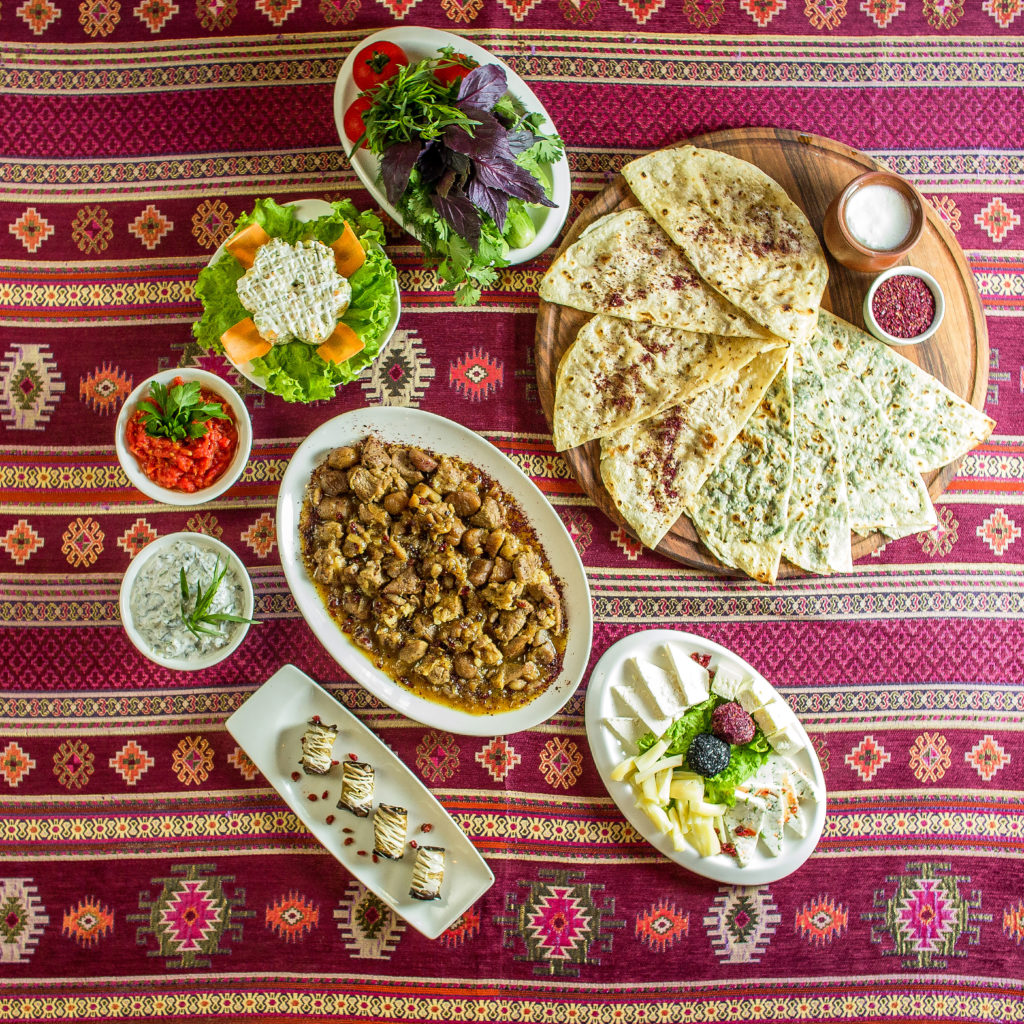Egyptian cuisine is a delightful combination of flavors and aromas that are sure to tantalize your taste buds. From the humble breakfast dish of foul to the hearty and filling koshari, Egyptian gastronomy is a treasure trove of culinary secrets waiting to be discovered. As an ancient civilization, Egypt has a rich history of culinary traditions that have been passed down from generation to generation. Each dish has a story to tell, reflecting the country’s diverse cultural influences and its unique geography. Whether you’re a foodie looking to explore the local cuisine or simply curious about the flavors of Egypt, there’s something for everyone in this delightful culinary journey. Join me as we explore the secrets of Egyptian gastronomy and discover the mouth-watering dishes that have been enjoyed by Egyptians for centuries.
It may interest you: Tour Adventure Across The Nile River

The history and cultural significance of Egyptian food
Egyptian cuisine has a rich history that dates back to the ancient times. The country’s strategic location at the crossroads of Africa, Asia, and Europe has made it a melting pot of cultures and traditions. Egyptian food has been influenced by the Greeks, Romans, Persians, Ottomans, and French, among others. Despite the foreign influences, Egyptian cuisine has managed to maintain its unique identity and authenticity.
Egyptian food is not just about nourishing the body but also the soul. The act of cooking and sharing food is deeply rooted in Egyptian culture, and it is considered a way to express love and care for others. Egyptians are known for their hospitality, and food is an essential part of their social gatherings. Whether it’s a family gathering, wedding, or religious festival, food plays a central role in bringing people together.
Egyptian cuisine is also symbolic of the country’s history and culture. For example, the use of spices in Egyptian cooking reflects the country’s long history of trade with other cultures. The use of fava beans in dishes such as foul reflects the country’s reliance on this affordable and nutritious food source. In many ways, Egyptian food is a reflection of the country’s resilience and resourcefulness.
The most popular Egyptian dishes: Foul, Koshari, Molokhia, and more
Egyptian cuisine is diverse and flavorful, with a wide range of dishes to choose from. Here are some of the most popular Egyptian dishes you should try:
Foul
Foul is a popular breakfast dish made from fava beans. The beans are boiled, mashed, and seasoned with garlic, lemon juice, and olive oil. Foul is usually served with pita bread and some vegetables, such as tomatoes and cucumbers. It’s a simple but delicious dish that is a staple of Egyptian cuisine.
Koshari
Koshari is a hearty and filling dish that is made from rice, lentils, chickpeas, and macaroni. It’s then topped with a spicy tomato sauce and crispy fried onions. Koshari is a popular street food in Egypt and is often sold from food carts.

Molokhia
Molokhia is a green leafy vegetable that is cooked with garlic and coriander and served with rice or bread. It’s a popular dish in Egypt, and it’s said to have originated in ancient Egypt. Molokhia is known for its health benefits, as it’s rich in vitamins and minerals.
Shawarma
Shawarma is a popular Middle Eastern dish that has become a staple of Egyptian cuisine. It’s made from marinated meat (usually chicken or beef) that is roasted on a spit and then shaved off and served in a pita bread with vegetables and sauce.
Falafel
Falafel is a vegetarian dish made from chickpeas that are ground into a paste, seasoned, and then fried into balls. It’s served in a pita bread with vegetables and sauce. Falafel is a popular street food in Egypt and is often eaten for breakfast or lunch.
Unique ingredients and spices used in Egyptian cooking
Egyptian cuisine is known for its use of spices and herbs. Some of the most commonly used spices in Egyptian cooking include cumin, coriander, cardamom, cinnamon, and nutmeg. These spices are often used in combination to create complex and flavorful dishes.
Another unique ingredient in Egyptian cooking is molasses. Molasses is made from boiled down sugar cane juice and is used to sweeten dishes such as koshari and molokhia. It adds a rich and distinctive flavor to these dishes.
Egyptian cooking also makes use of a variety of herbs, such as parsley, cilantro, dill, and mint. These herbs are often used as garnishes or to add flavor to dishes such as falafel and shawarma.
Regional differences in Egyptian cuisine
Egypt is a large country with a diverse geography, and this is reflected in its cuisine. Each region of Egypt has its own unique culinary traditions and specialties. For example, in the coastal regions, seafood is a staple of the local cuisine. In the Nile Delta region, rice dishes such as koshari are popular. In Upper Egypt, dishes such as molokhia and feseekh (a type of salted fish) are popular.
Vegetarian and vegan options in Egyptian food
Egyptian cuisine is naturally vegetarian and vegan-friendly, with many dishes made from vegetables and legumes. Foul, koshari, and molokhia are all vegetarian dishes, and falafel can easily be made vegan by omitting the yogurt sauce. Many Egyptian dishes are also gluten-free, making them a good option for those with dietary restrictions.
Egyptian desserts and beverages
No meal is complete without dessert, and Egyptian cuisine has a variety of sweet treats to choose from. Here are some of the most popular Egyptian desserts:
Baklava
Baklava is a sweet pastry made from layers of phyllo dough filled with chopped nuts and honey syrup. It’s a popular dessert throughout the Middle East and Mediterranean regions, including Egypt.
Basbousa
Basbousa is a sweet cake made from semolina flour and soaked in a sugar syrup. It’s often flavored with coconut or almond and is a popular dessert in Egypt.
Umm Ali
Umm Ali is a sweet and creamy bread pudding made from puff pastry, milk, and nuts. It’s similar to the European dessert, bread pudding, but with an Egyptian twist.
As for beverages, Egypt is known for its tea culture. Egyptian tea is made from black tea leaves and is usually served with sugar and mint. Another popular Egyptian beverage is hibiscus tea, which is made from dried hibiscus flowers and is served hot or cold.
Dining etiquette in Egypt
Egyptians are known for their hospitality and will often go out of their way to make their guests feel welcome. When dining in Egypt, it’s important to follow some basic etiquette rules:
- Always wait for the host to invite you to sit down and start eating.
- Use your right hand to eat, as the left hand is considered unclean.
- It’s polite to leave a little bit of food on your plate to show that you are full.
- It’s customary to offer food to others at the table, especially if they are seated next to you.
- When drinking tea, it’s polite to hold the cup with both hands as a sign of respect.
Egyptian food festivals and events
Egypt is home to a variety of food festivals and events throughout the year. One of the most popular is the Cairo Food Festival, which is held in October and features food from some of the city’s best restaurants and street vendors. Another popular event is the Egyptian Street Food Festival, which is held in various locations throughout the country and features a wide range of traditional and modern Egyptian dishes.
Egyptian cuisine is a rich and diverse culinary tradition that has been shaped by centuries of history and culture. From the humble breakfast dish of foul to the hearty and filling koshari, Egyptian gastronomy is a treasure trove of culinary secrets waiting to be discovered. The use of spices, herbs, and unique ingredients such as molasses give Egyptian food its distinctive flavor and aroma. Whether you’re a foodie looking to explore the local cuisine or simply curious about the flavors of Egypt, there’s something for everyone in this delightful culinary journey.
Make your dream trip possible, receive a personalized quote and payment facilities to suit your needs
No compromises!




